
Dangerous Visions is a science fiction short story anthology edited by American writer Harlan Ellison and illustrated by Leo and Diane Dillon. It was published in 1967.
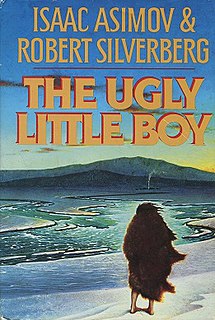
"The Ugly Little Boy" is a science fiction short story by American writer Isaac Asimov. The story first appeared in the September 1958 issue of Galaxy Science Fiction under the title "Lastborn", and was reprinted under its current title in the 1959 collection Nine Tomorrows. The story deals with a Homo neanderthalensis child which is brought to the future by means of time travel. Robert Silverberg later expanded it into a novel with the same title published in 1992.
This is a bibliography of the books written or edited by Isaac Asimov, arranged alphabetically. Asimov was a prolific author, and he engaged in many collaborations with other authors. This list may not yet be complete. The total number of books listed here is over 500. Asimov died in 1992 at age 72; a small number of his books were published posthumously.

"Nightfall" is a 1941 science fiction short story by the American writer Isaac Asimov about the coming of darkness to the people of a planet ordinarily illuminated by sunlight at all times. It was adapted into a novel with Robert Silverberg in 1990. The short story has been included in 48 anthologies and has appeared in six collections of Asimov's stories. In 1968, the Science Fiction Writers of America voted "Nightfall" the best science fiction short story written prior to the 1965 establishment of the Nebula Awards and included it in The Science Fiction Hall of Fame Volume One, 1929–1964.
The first Golden Age of Science Fiction, often recognized in the United States as the period from 1938 to 1946, was an era during which the science fiction genre gained wide public attention and many classic science fiction stories were published. In the history of science fiction, the Golden Age follows the "pulp era" of the 1920s and 1930s, and precedes New Wave science fiction of the 1960s and 1970s. The 1950s are a transitional period in this scheme; however, Robert Silverberg, who came of age in the 1950s, saw that decade as the true Golden Age.
Martin Harry Greenberg was an American academic and anthologist in many genres, including mysteries and horror, but especially in speculative fiction. In all, he compiled 1,298 anthologies and commissioned over 8,200 original short stories. He founded Tekno Books, a packager of more than 2000 published books. He was also a co-founder of the Sci-Fi Channel. Greenberg was also an expert in terrorism and the Middle East. He was a longtime friend, colleague and business partner of Isaac Asimov.

Henry Slesar was an American author, playwright, and copywriter. He is famous for his use of irony and twist endings. After reading Slesar's "M Is for the Many" in Ellery Queen's Mystery Magazine, Alfred Hitchcock bought it for adaptation and they began many successful collaborations. Slesar wrote hundreds of scripts for television series and soap operas, leading TV Guide to call him "the writer with the largest audience in America."

More Tales of the Black Widowers is a collection of mystery short stories by American author Isaac Asimov, featuring his fictional club of mystery solvers, the Black Widowers. It was first published in hardcover by Doubleday in October 1976, and in paperback by the Fawcett Crest imprint of Ballantine Books in November 1977. The first British edition was issued by Gollancz in April 1977.

Isaac Asimov Presents The Great SF Stories 19 (1957) is the nineteenth volume of Isaac Asimov Presents The Great SF Stories, which is a series of short story collections, edited by Isaac Asimov and Martin H. Greenberg, which attempts to list the great science fiction stories from the Golden Age of Science Fiction. They date the Golden Age as beginning in 1939 and lasting until 1963. This volume was originally published by DAW books in February 1989.
Isaac's Universe is a fictional universe created by Isaac Asimov for other science fiction writers to use as a setting. It introduces the collaborative science fiction universe created by Asimov which eventually resulted in five volumes: three short story collections and two novels. It was initiated by Martin H. Greenberg, who also edited and published its three short stories collection by Avon Books starting in 1990.

Super-Science Fiction was an American digest science fiction magazine published from 1956 to 1959, edited by W. W. Scott and published by Feature Publications. Robert Silverberg and Harlan Ellison, who were at the start of their careers at the time, were already selling crime stories to Scott for his other magazines, Trapped and Guilty, and quickly started bringing Scott science fiction stories as well. Scott bought scores of stories from the pair during the magazine's short life; much of the remainder was sent in by literary agents, and generally comprised material rejected by other magazines first, though Scott did obtain two stories from Isaac Asimov.
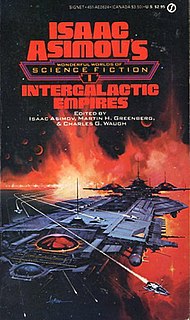
Isaac Asimov's Wonderful Worlds of Science Fiction is a series of ten themed paperback science fiction anthologies edited by Isaac Asimov, Martin H. Greenberg and Charles G. Waugh, a companion set to the twelve volume Isaac Asimov's Magical Worlds of Fantasy, produced by the same editors. It was published by Signet/New American Library from 1983 to 1990.

Intergalactic Empires is an anthology of science fiction short stories edited by Isaac Asimov, Martin H. Greenberg and Charles G. Waugh as the first volume in their Isaac Asimov's Wonderful Worlds of Science Fiction series. It was first published in paperback by Signet/New American Library in December 1983. The first British edition was issued in paperback by Robinson in July 1988.
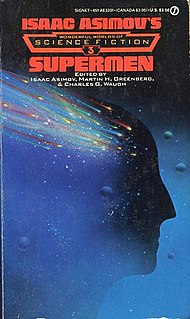
Supermen is an anthology of science fiction short stories edited by Isaac Asimov, Martin H. Greenberg and Charles G. Waugh as the third volume in their Isaac Asimov's Wonderful Worlds of Science Fiction series. It was first published in paperback by Signet/New American Library in October 1984. The first British edition was issued in paperback by Robinson in 1988.

Monsters is an anthology of science fiction short stories edited by Isaac Asimov, Martin H. Greenberg and Charles G. Waugh as the eighth volume in their Isaac Asimov's Wonderful Worlds of Science Fiction series. It was first published in paperback by Signet/New American Library in July 1988. The first British edition was issued in paperback by Robinson in July 1989.

"Giant Killer" is a science fiction short story by A. Bertram Chandler. It was first published in the October 1945 issue of Astounding Science Fiction, and later included in many science fiction anthologies, including World of Wonder edited by Fletcher Pratt. In 1996 it was shortlisted for a Retro Hugo Award for Best Novella.

Dinosaurs is an anthology of science fiction short works edited by Martin H. Greenberg. It was first published in hardcover by Donald I. Fine in February 1996, with a second edition issued by Niagara/Ulverscroft in October of the same year.
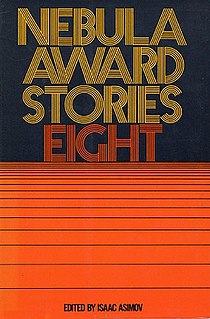
Nebula Award Stories Eight is an anthology of science fiction short works edited by American writer Isaac Asimov. It was first published in hardcover in November 1973, in the United States by Harper & Row and in the United Kingdom by Gollancz. The British edition bore the variant title Nebula Award Stories 8. Paperback editions followed from Berkley Medallion in the U.S. in September 1975, and Panther in the U.K. in the same year; both paperback editions adopted the British version of the title. The book has also been published in German.

New Dimensions II: Eleven Original Science Fiction Stories is an anthology of original science fiction short stories edited by American writer Robert Silverberg, the second in a series of twelve. It was first published in hardcover by Doubleday in December 1972, with a paperback edition under the variant title New Dimensions 2 following from Avon Books in December 1974.
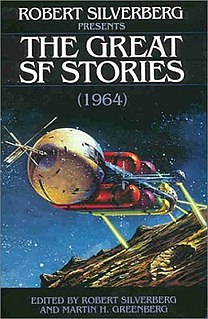
Robert Silverberg Presents the Great SF Stories: 1964 is an American anthology of short stories, edited by Robert Silverberg and Martin H. Greenberg, first published in hardcover by NESFA Press in December 2001. It is a continuation of the Isaac Asimov Presents The Great SF Stories series of short story anthologies, which attempts to list the great science fiction stories from the Golden Age of Science Fiction. This book is a continuation of the book series The Great SF Stories originally edited by Isaac Asimov and Martin H. Greenberg with the last one published in 1992.















